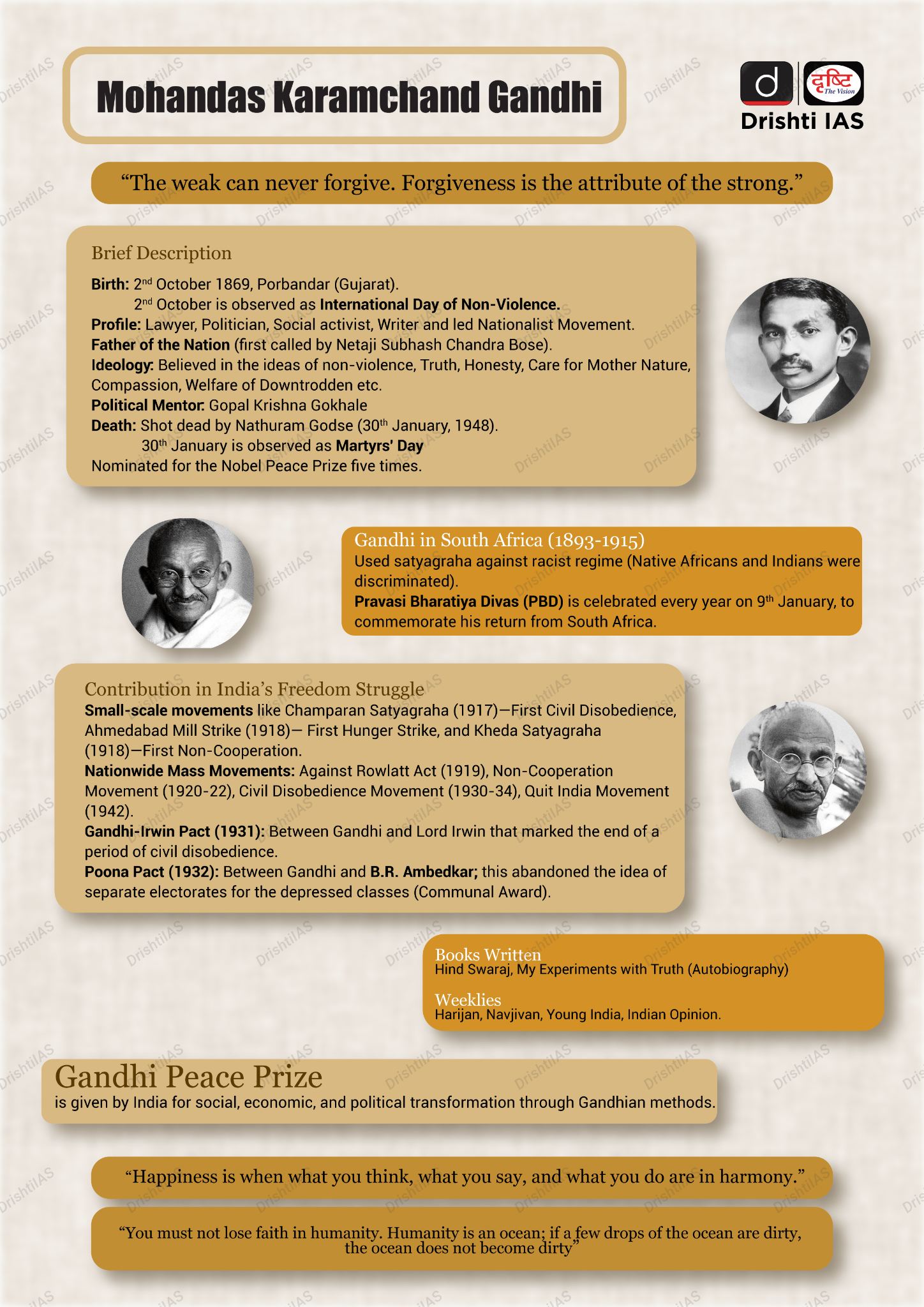100 years of the Belgaum Congress Session | 27 Dec 2024
Why in News?
The centenary of the 1924 Belgaum Congress session is being celebrated in Belagavi, Karnataka, on 26-27th December 2024.
- This event commemorates Mahatma Gandhi's chairmanship of the historic 39th All-India Congress session in Belgaum, where he made significant contributions to the Congress Party's ideology and organizational structure.
What is Significance of the 1924 Belgaum Session of Congress?
- Gandhi's Leadership: It was the only Congress session which was presided over by Gandhiji as the party chief. Gandhi had held the post of the Congress president between December 1924 and April 1925.
- Gandhi’s first visit to Belgaum in 1916 was at the invitation of local leader Deshpande.
- Focus on Social Change: Gandhi emphasized combating untouchability, promoting khadi, and supporting village industries, transforming Congress into a movement for both political independence and social reform.
- Khadi spinning was mandatory for Congress members and mandated the submission of 2,000 yards of khadi cloth monthly.
- Gandhi reduced Congress membership fees by 90%.
- Hindu-Muslim Unity: Gandhi used the platform to advocate for Hindu-Muslim unity, which was essential to the broader freedom movement.
- Social and Economic Upliftment: Gandhi also focused on issues like sanitation, town planning, and the use of cows for economic upliftment of farmers, with a specific stance on cow protection.
- He stressed that his advocacy for cow protection was not linked to religious conversion or violence against Muslims.
- He praised the sanitation volunteers, noting that 40 out of 70 were Brahmins, emphasising social service across castes.
- He criticized the session's excessive expenditure on VIPs and called for equal treatment of all members in future sessions.
- Cultural Significance: The session was marked by notable musical performances, including by Hindustani maestro Vishnu Digambar Paluskar and young Gangubai Hangal, along with the Kannada song “Udayavagali Namma Chaluva Kannada Nadu.”
- Legacy of the Session: The Pampa Sarovara well, dug for the session, continues to supply water to parts of south Belagavi.
Key Sessions of the Indian National Congress
- 1885: First Session in Bombay, presided by W.C. Banerjee – Formation of the Indian National Congress.
- 1886: Second Session in Calcutta, presided by Dadabhai Naoroji.
- 1887: Third Session in Madras, presided by Syed Badruddin Tyabji – First Muslim President.
- 1888: Fourth Session in Allahabad, presided by George Yule – First English President.
- 1896: Calcutta – National Song ‘Vande Mataram’ sung by Rabindranath Tagore.
- 1901: Calcutta – First appearance of Gandhiji on the Congress platform.
- 1905: Benaras – Formal proclamation of the Swadeshi Movement. Held under the presidency of Gopal Krishna Gokhale.
- 1906: Calcutta – President Dadabhai Naoroji – Resolutions on Swaraj, Boycott, Swadeshi & National Education.
- 1907: Surat – President Rash Bihari Ghosh – Split between Moderates and Extremists.
- 1916: Lucknow – President A.C. Majumdar – Unity between Moderates and Extremists; Lucknow Pact with Muslim League.
- 1917: Calcutta – President Annie Besant – First Woman President of Congress.
- 1919: Amritsar – President Motilal Nehru – Support for Khilafat Movement.
- 1920: Calcutta – President Lala Lajpat Rai – Gandhi moves Non-cooperation resolution.
- 1924: Belgaum – President Mahatma Gandhi – Only session presided over by Gandhi.
- 1927: Madras – President Dr. M.A. Ansari – Resolutions against Simon Commission and for Purna Swaraj.
- 1929: Lahore – President Jawaharlal Nehru – Resolution on Poorna Swaraj; Civil Disobedience movement launched.
- 1931: Karachi – President Vallabhbhai Patel – Resolutions on Fundamental Rights and National Economic Programme.
- 1936: Lucknow – President Jawaharlal Nehru – Shift towards socialist ideas.
- 1938: Haripura – President Subhas Chandra Bose – National Planning Committee formed.
- 1939: Tripuri – President Rajendra Prasad – Bose re-elected but resigns; Forward Bloc formed.
- 1940: Ramgarh – President Abul Kalam Azad – Civil Disobedience movement postponed.
- 1946: Meerut – President J.B. Kripalani – Last session before Independence.
UPSC Civil Services Examination, Previous Year Question (PYQ)
Prelims
Q1. Who among the following is associated with ‘Songs from Prison’, a translation of ancient Indian religious lyrics in English? (2021)
(a) Bal Gangadhar Tilak
(b) Jawaharlal Nehru
(c) Mohandas Karamchand Gandhi
(d) Sarojini Naidu
Ans: (c)
Q2. With reference to the British colonial rule in India, consider the following statements: (2019)
- Mahatma Gandhi was instrumental in the abolition of the system of ‘indentured labour’.
- In Lord Chelmsford’s ‘War Conference’, Mahatma Gandhi did not support the resolution on recruiting Indians for World War.
- Consequent upon the breaking of Salt Law by Indian people, the Indian National Congress was declared illegal by the colonial rulers.
Which of the statements given above are correct?
(a) 1 and 2 only
(b) 1 and 3 only
(c) 2 and 3 only
(d) 1, 2 and 3
Ans: (b)

